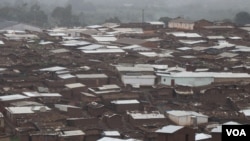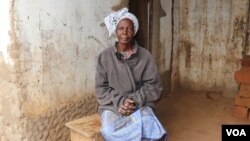The U.N. refugee agency, UNHCR, says it "deeply regrets" Malawi's decision to force about 8,000 refugees living in rural and urban areas back to the overcrowded Dzaleka refugee camp. Malawi's minister of homeland security last week said the forced relocations would start after November 30, when a deadline expires on voluntary returns.
UNHCR is asking the Malawi government to reconsider its decision to force refugees and asylum-seekers living in villages, towns, and cities back into the overcrowded Dzaleka camp.
In a statement released Saturday, UNHCR says relocating self-sufficient and productive people into the camp would not only lead to loss of livelihoods but also compel them to rely on dwindling humanitarian aid.
UNHCR says as of October 31 it had received less than a fourth of funds needed this year in Malawi to support the camp’s refugees and asylum-seekers.
The agency’s reporting officer in Malawi, Kenyi Emanuel, said adding the estimated 8,000 refugees living outside the camp would bring more misery.
“The camp itself is extremely overcrowded, he said. “The camp was only meant to host between 10,000 and 12,000 people but now, it is hosting 56,000 refugees and asylum seekers. It is a five-fold increase.”
Dzaleka is home to refugees and asylum-seekers from Burundi, the Democratic Republic of Congo, Ethiopia, Rwanda, and Somalia.
In August, Malawi’s government set November 30 as a deadline for those living in rural areas outside the camp to return and February 1 for those living in cities.
The decision came after a high court in Blantyre dismissed the refugees’ appeal against the government’s decision last year to return them to the camp.
Malawi’s Minister of Homeland Security Jean Sendeza at a televised press conference Thursday said the returns were in line with rules against refugees working or living outside the camp.
“As we continue with the relocation exercise, I request patience for all the stakeholders as this is an ongoing process,” he said. “In the same vein, I appeal to the general public to refrain from getting into issues of the refugees, especially on the relocation exercise. Let those that are assigned to do the work do so without any form of interference.”
Limited aid at the Dzaleka camp led to refugees holding sporadic protests in November, some of which turned violent.
Refugees seized a World Food Program vehicle on November 2 after some refugees were removed from a list for receiving food rations.
On November 22, a group of refugees broke windows on vehicles belonging to Plan International Malawi employees and looted a warehouse after being told they would not receive temporary shelters. Police fired tear gas to disperse the protest.
Bukuru Habona is a refugee from Burundi who left the camp in 2008 to live and work in Malawi’s capital, Lilongwe.
He said moving back to the camp with his three children would ruin their chance for better education.
“Definitely they will just stay home,” he said. “And they will not stay home, they will stay in the bush because we have no house and we [will] have no food. Because these days staying in someone’s house, my brother, is a very big problem. You can even have a friend, but you cannot stay there even a week.”
Malawi’s government says it has budgeted $300,000 for tents for the returned refugees and their transport to the camp, which is expected to start this week.
Homeland Security Minister Sendeza said UNHCR also pledged $58 million to reconstruct the abandoned Luwani refugee camp to help decongest Dzaleka.
Luwani camp housed more than 300,000 Mozambican refugees fleeing the 1977 to 1992 civil war.
It was closed in 2007, then reopened in 2016 to house about 12,000 Mozambicans fleeing fresh conflict at home.
When peace allowed Mozambicans to return home, Luwani closed again in 2019.
UNHCR confirmed plans to restore the camp but say they’re facing challenges sourcing the needed funding.





